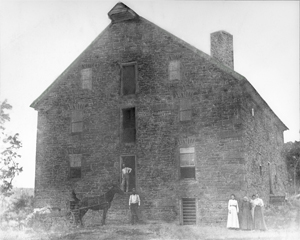Historical documents are particularly useful when researching family history. They take us to a point in time and to an era and can give insight into how groups of people handled complex and every day decisions. They also shine a light on the path our ancestors took in forming beliefs and customs—what is referred to contemporarily with an all encompassing vagueness as “our core beliefs”. One such principle of the United States is religious freedom.
In my family history is a group of my ancestors, led by Ezekiel Merrill, who were the first European settlers of an area of Maine where they founded the town of Andover. They first broke ground on a property, now known as Merrill house, in 1792.
In 1822 Ezekiel, his son Ezekiel Jr. and the adult men of Andover gathered and signed a covenant establishing their religious community. A print of the document hangs in my house:

A partial transcription:
The subscribeing inhabitants of the town
of Andover in the County of Oxford in the
State of Maine, being impressed with the
importance of the public worship of
Almighty God do agree to apointe and do
hereby apointe and unite Ourselves together
as a religious society to be denomination “The
First Congregational Society in Andover”.
We agree that we will assemble together
and choose necessary and proper officers for the
due management of said society and of the funds
that do now, or hereafter shall belong to it.
We further agree that we will be united within
this signing of a majority of the subscribers whenever
they shall assemble.
Andover January 21, 1822
John Stricklan, Samul Poor, Ezekiel Merrill Jr., Ezekiel Merrill [Sr.], Winthrop ?????, Nathan Swan, Nath F Abbot, Silvanus Poor, Thomas Abbott, Moses Merrill, Enoch Abbot, Stephan Lovejoy, Timothy Abbot, Oliver Strickland, Benjamin H Hall, ?????? ?????, James Stevins, Jacab ?????, Daniel Abbot, Samuel Marston, Moses Abbott ?, John Sweat, John Abbot, Jonathan Abbot, Benjamin Lovejoy, E___tus P Poor, Francis Swan, ????? Aboott, M ? Abiel Lovejoy, Thomas Bragg, John Abbot Jr., Peter Webster, Amos Abbott, Enos Abbot
For many New Englanders of the era the religious community was Congregational and dated back through the traditions brought by the passengers of the Mayflower and their contemporaries. The Pilgrims came from the Separatists Movement in England in the time of the death of Elizabeth the First and the subsequent rise to the throne of James the First. The Separatists petitioned James, on his way to his coronation, for the separation of church and state in deciding several issues of religious practice.
For the scope of this post suffice it to say that James was not interested in granting any request that removed his powers—in anything—and while some of the group, Reformationists or Reformers accepted the relatively small compromises James made, the Separatists, or Pilgrims, set off to Leyden in Holland and later to the New World where they established their Freedom of Religion.
This notion has carried forward and grown into the religious freedom we value so highly in America today. It is a great example of a good idea “for me” becoming a Great Idea when shared with and thus by “all”.
Historical documents are where we find how our ancestors—for better or worse or through shear luck—paved the way for where we are today.
Relevant Reads:
We try to recommend books that are shelf-worthy and great additions to historical and family research.
Save
Save
Save
Save
Save
Save
Save


